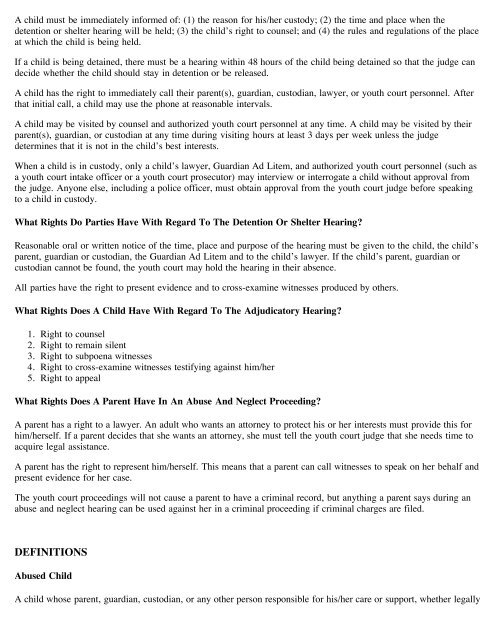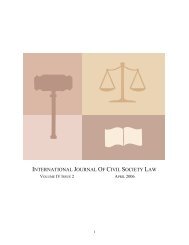Hurricane Katrina: Legal Issues - Columbus School of Law
Hurricane Katrina: Legal Issues - Columbus School of Law
Hurricane Katrina: Legal Issues - Columbus School of Law
You also want an ePaper? Increase the reach of your titles
YUMPU automatically turns print PDFs into web optimized ePapers that Google loves.
A child must be immediately informed <strong>of</strong>: (1) the reason for his/her custody; (2) the time and place when the<br />
detention or shelter hearing will be held; (3) the child’s right to counsel; and (4) the rules and regulations <strong>of</strong> the place<br />
at which the child is being held.<br />
If a child is being detained, there must be a hearing within 48 hours <strong>of</strong> the child being detained so that the judge can<br />
decide whether the child should stay in detention or be released.<br />
A child has the right to immediately call their parent(s), guardian, custodian, lawyer, or youth court personnel. After<br />
that initial call, a child may use the phone at reasonable intervals.<br />
A child may be visited by counsel and authorized youth court personnel at any time. A child may be visited by their<br />
parent(s), guardian, or custodian at any time during visiting hours at least 3 days per week unless the judge<br />
determines that it is not in the child’s best interests.<br />
When a child is in custody, only a child’s lawyer, Guardian Ad Litem, and authorized youth court personnel (such as<br />
a youth court intake <strong>of</strong>ficer or a youth court prosecutor) may interview or interrogate a child without approval from<br />
the judge. Anyone else, including a police <strong>of</strong>ficer, must obtain approval from the youth court judge before speaking<br />
to a child in custody.<br />
What Rights Do Parties Have With Regard To The Detention Or Shelter Hearing?<br />
Reasonable oral or written notice <strong>of</strong> the time, place and purpose <strong>of</strong> the hearing must be given to the child, the child’s<br />
parent, guardian or custodian, the Guardian Ad Litem and to the child’s lawyer. If the child’s parent, guardian or<br />
custodian cannot be found, the youth court may hold the hearing in their absence.<br />
All parties have the right to present evidence and to cross-examine witnesses produced by others.<br />
What Rights Does A Child Have With Regard To The Adjudicatory Hearing?<br />
1.<br />
Right to counsel<br />
2.<br />
Right to remain silent<br />
3.<br />
Right to subpoena witnesses<br />
4.<br />
Right to cross-examine witnesses testifying against him/her<br />
5.<br />
Right to appeal<br />
What Rights Does A Parent Have In An Abuse And Neglect Proceeding?<br />
A parent has a right to a lawyer. An adult who wants an attorney to protect his or her interests must provide this for<br />
him/herself. If a parent decides that she wants an attorney, she must tell the youth court judge that she needs time to<br />
acquire legal assistance.<br />
A parent has the right to represent him/herself. This means that a parent can call witnesses to speak on her behalf and<br />
present evidence for her case.<br />
The youth court proceedings will not cause a parent to have a criminal record, but anything a parent says during an<br />
abuse and neglect hearing can be used against her in a criminal proceeding if criminal charges are filed.<br />
DEFINITIONS<br />
Abused Child<br />
A child whose parent, guardian, custodian, or any other person responsible for his/her care or support, whether legally

















